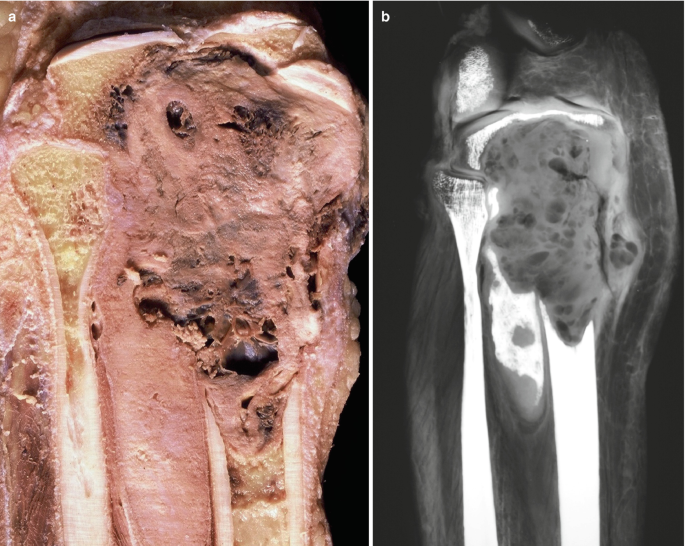
Overview
Fibrosarcoma is a rare malignant tumor that arises from fibroblasts, the cells that produce connective tissue. It can occur in soft tissues or bones, affecting both children (infantile/congenital type) and adults (typically in deep soft tissues of limbs or trunk).
Symptoms
- Painless lump or mass
- Swelling in the affected area
- Pain or numbness if nerves are compressed
- Limited range of motion or functional impairment
Causes & Risk Factors
- Radiation exposure (e.g., previous cancer treatment)
- Genetic syndromes (e.g., Li-Fraumeni syndrome)
- Scar tissue from burns or previous injury
- More common in adults aged 30–60, but congenital form seen in infants
Diagnosis
- Physical exam and imaging (MRI, CT scan)
- Core needle or surgical biopsy
- Histopathology to distinguish from other soft tissue sarcomas
- Chest imaging to evaluate for metastasis (especially lungs)
Treatment Options
- Wide surgical excision (main treatment approach)
- Radiation therapy (often post-op to reduce recurrence)
- Chemotherapy (limited efficacy, used for high-grade or metastatic cases)
- Targeted or immunotherapy (under investigation in clinical trials)
Prognosis
- Depends on tumor size, grade, location, and resectability
- Low-grade fibrosarcomas have better prognosis
- 5-year survival rate varies from 50% to 80% for localized disease
Living with this Cancer Type
- Functional rehab and physical therapy
- Psychosocial support for chronic illness and recovery
- Long-term surveillance for recurrence or lung metastases
Prevention & Screening
- No known prevention
- Genetic counseling for hereditary cancer syndromes
- Close monitoring of previously irradiated areas
FAQs
Q: Is fibrosarcoma the same in children and adults?
A: No. Infantile/congenital fibrosarcoma has a better prognosis and different treatment response.
Q: Can it come back after surgery?
A: Yes, local recurrence is possible. Regular follow-up is essential.
Q: Does it spread?
A: Yes, often to the lungs. Imaging is required during staging and follow-up.
Resources
- Sarcoma Foundation of America
- American Cancer Society
- ClinicalTrials.gov
Understand Precision Testing
Learn how liquid biopsy and chemo sensitivity testing can personalize your treatment plan.
Make Informed Decisions
Gain knowledge to actively participate in treatment discussions with your healthcare team.
Improve Treatment Outcomes
Discover how precision medicine and metabolic therapies can enhance treatment effectiveness.
Start Your Educational Journey Today
Empower yourself with knowledge about precision metabolic oncology and take an active role in your cancer care journey.
Need More Information?
Our team of oncology experts is here to help you understand your diagnosis and treatment options.
